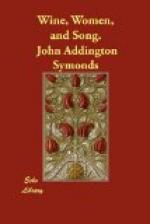Hide, O hide those hills of snow,
Twinned upon thy breast that rise,
Where the virgin fountains flow
With fresh milk of Paradise!
Thy bare bosom breathes of myrrh,
From thy whole self pleasures stir,
Pleasures stir.
Hide, O hide those paps that tire
Sense and spirit with excess
Of snow-whiteness and desire
Of thy breast’s deliciousness!
See’st thou, cruel, how I swoon?
Leav’st thou me half lost so soon?
Lost so soon?
In rendering this lyric to Lydia, I have restored the fifth stanza, only one line of which,
“Quid mihi sugis vivum sanguinem,”
remains in the original. This I did because it seemed necessary to effect the transition from the stanzas beginning Pande, puella, pande, to those beginning Conde papillas, conde.
Among these more direct outpourings of personal passion, place may be found for a delicate little Poem of Privacy, which forms part of the Carmina Burana. Unfortunately, the text of this slight piece is very defective in the MS., and has had to be conjecturally restored in several places.
A POEM OF PRIVACY.
No. 33.
When a young man, passion-laden,
In a chamber meets a maiden,
Then felicitous
communion,
By love’s strain between
the twain,
Grows from forth
their union;
For the game, it hath no name,
Of lips, arms, and hidden
charms.
Nor can I here forbear from inserting another Poem of Privacy, bolder in its openness of speech, more glowing in its warmth of colouring. If excuse should be pleaded or the translation and reproduction of this distinctly Pagan ditty, it must be found in the singularity of its motive, which is as unmedieval as could be desired by the bitterest detractor of medieval sentiment. We seem, while reading it, to have before our eyes the Venetian picture of a Venus, while the almost prosaic particularity of description illustrates what I have said above about the detailed realism of the Goliardic style.
FLORA.
No. 34.
Rudely blows the winter blast,
Withered leaves are falling
fast,
Cold hath hushed the birds
at last.
While the heavens
were warm and glowing,
Nature’s
offspring loved in May;
But man’s
heart no debt is owing
To
such change of month or day
As
the dumb brute-beasts obey.
Oh, the joys of this possessing!
How unspeakable the blessing
That
my Flora yields to-day!
Labour long I did not rue,
Ere I won my wages due,
And the prize I played for
drew.
Flora with her
brows of laughter,
Gazing
on me, breathing bliss,
Draws my yearning
spirit after,
Sucks
my soul forth in a kiss:
Where’s
the pastime matched with this?
Oh, the joys of this possessing!
How unspeakable the blessing
Of
my Flora’s loveliness!




